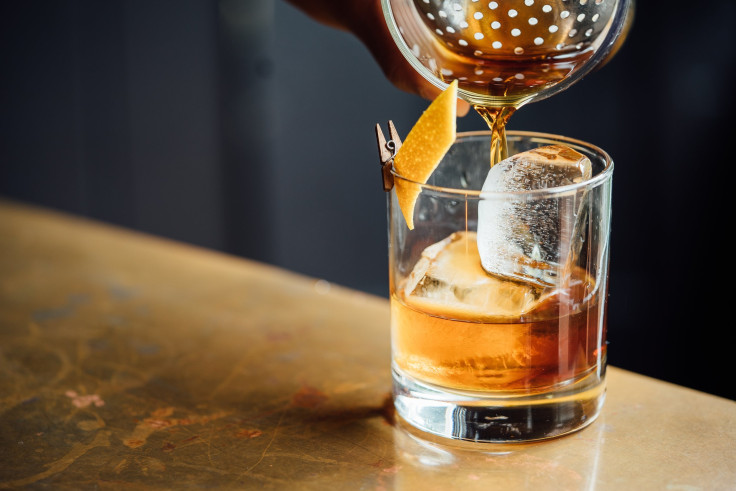Alcohol Addiction Treatment? Scientists Identify Gene Variant That May Curb Binge Drinking In Social Drinkers

Happy Hour after work can turn from one drink into endless rounds of beers, cocktails, and shots. The ability to stop drinking when you're feeling tipsy or drunk comes easier to some than others. An international research team from Europe and UT Southwestern Medical Center has identified a gene variant that can stop people from craving a drink; the discovery could potentially treat addiction in binge drinkers.
"The study identified a variation in the β-Klotho gene linked to the regulation of social alcohol consumption," said Dr. David Mangelsdorf, Chair of Pharmacology at UT Southwestern and a corresponding author of the study, in a statement.
The β-Klotho gene directs the production of the B-Klotho protein that forms part of a receptor complex in the brain. This formation takes place in the central nervous system, (the brain and the spinal cord) with classic receptors for fibroblast growth factor 21 (FGF21), a hormone produced in the liver. The gene works via a feedback circuit that goes from the liver, which processes alcohol, to the brain, where the receptors are able to form a receptor complex, binding the liver hormone FGF21 to signal the response to alcohol, according to Mangelsdorf.
Read More: Genetic Basis for Alcohol Dependence
In the study, published in the Proceedings of the National Academy of Sciences (PNAS), researchers analyzed the DNA samples from more than 105,000 people of European descent who were also questioned about their weekly drinking habits.
The study compared the genetics of light and heavy social drinkers of European ancestry participating in nearly four dozen other large population studies worldwide. In addition to providing samples for genetic analysis, the participants answered questionnaires on their weekly drinking habits. Heavy drinking was defined as more than 21 drinks per week for men and more than 14 drinks per week for women. Light drinking was considered to be 14 drinks or less per week for men and seven drinks or less per week for women. A "drink" was the equivalent of a small glass of wine, or a half pint of beer.
The researchers identified a variation in the β-Klotho gene — seen in approximately 40 percent of people in the study — that is linked to a decreased desire to drink alcohol. People with this variant tend to drink less than those without it.
The European research team knew the UT Southwestern team had worked on β-Klotho and the liver hormone fibroblast growth factor 21 (FGF21) that binds to the β-Klotho-FGF21 receptor complex. But, they sought to understand the role of the gene variant in alcohol drinking behavior.
To observe how this gene works, UT Southwestern researchers offered mice genetically unable to produce β-Klotho a choice between water and alcohol. The genetically altered mice chose alcohol even when they were given the hormone FGF21, indicating that FGF21's ability to suppress the desire for alcohol depends on the presence of β-Klotho. The hormone is known to directly affect the central nervous system in mice. Lacking the gene altogether led the mice to be significantly more attracted to alcohol.
The findings note a feedback loop that exists where FGF21 is produced in the liver in response to sugar and alcohol intake, which then acts directly on the brain to limit consumption. However, the possibility that β-Klotho acts by affecting neighboring genes cannot be ruled out. This warrants further genetic studies.
A similar 2011 study in Molecular Psychiatry found our genes can heavily influence our susceptibility to vices, like alcohol. Specifically, individuals who possess the 118G variant of the mu-opioid receptor may experience more pleasurable effects from alcohol. This puts them at greater risk for developing alcohol abuse and dependence. This may also explain why some people with this genetic variant benefit most from treatment that directly targets the dopamine receptors. Understanding this gene variant and its relationship to dopamine, along with the ability to detect the gene variant in individuals could potentially lead to successful prevention measures.
Read More: Experimental Drug May Help Curb Alcohol Addiction, Especially For Those With High Stress
Excessive alcohol consumption causes more than 3 million deaths per year. These complementary studies offer a new perspective on how alcohol addiction should be viewed and treated.
"Much of the research on alcohol consumption has focused on addiction. However, the overall burden of alcohol-associated disease reflects the total amount of alcohol consumed, not just addiction” said Dr. Kliewer, a Professor of Molecular Biology and Pharmacology at UT Southwestern.
This could lead to development of drugs to regulate alcohol consumption. The researchers caution alcoholics were not part of the current study. A shift from heavy to moderate social drinking could have major public health benefits, such as reduced heart disease risk. High alcohol consumption is linked to two heart disease risk factors in particular: high blood pressure and obesity, according to the American Heart Association.
Source: Schumann a G, Liub C, O’Reilly P et al. KLB is associated with alcohol drinking, and its gene product β-Klotho is necessary for FGF21 regulation of alcohol preference. PNAS. 2016.



























